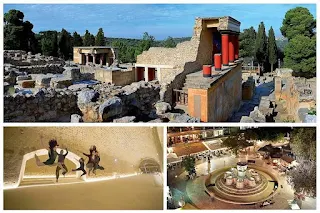Plato, a greek philosopher, gave us the first known account
of Atlantis. Plato was said to have lived from about 428 to 348 B.C. He was a
student of Socrates. After studying with Socrates, Plato opened up his own
philosophy school. There he began to write his philosophies in a dialogue form.
These dialogues always featured Socrates as the main character. In the
dialogues Timaeus and Critias, he wrote about an amazing place called Atlantis.
He believed that Atlantis was located in the Atlantic Ocean
to the west of the Straits of Gibraltar. Great continent extremely
technologically advanced, was destroyed and lost by a rush of ocean covering
the evidence to us to this day. Atlantis was approximately the size of Libya
and Asia put together. The city of Atlantis was explained to be in the shape of
a bullseye. Alternating rings of land separated by the Atlantic Ocean.
This empire was founded by the God of the Sea, Poseidon.
Poseidon had 5 children on this island. Atlas, the firstborn, had the continent
and the surrounding ocean named after him. The land was then divided into ten
sections to be ruled by each of his sons, and their heirs.
Plato believed that Atlantis had a great army, probably of
around 1.2 million armed men. He also believed that the army had a vast number
of chariots. Horses were definitely used. This was the theory that had caused
many to believe that the horse that evolved from Asia became domesticated in
Atlantis.
Elephants are supposedly also a very big part of the
Atlantean culture. Plato even writes himself: "There were a great number of elephants on the island,
for there was ample provision of food for all sorts of animals, including for
the animal which is the largest and the most voracious of all."
The strange part about the elephants, is that the epoch in when
the continent of Atlantis was supposedly alive and flourishing, mastodons and
mammoths were abundant, and the elephant did not come about until approximately
the supposed time when the continent of Atlantis was believed to have
"fallen" into the ocean, the same time when mastodons and mammoths
became extinct.
The Location of Atlantis
Plato said Atlantis was a large island in the Atlantic
Ocean, somewhere west of the Pillars of Hercules (the Rock of Gibraltar). This
description has lead to many people believing that Atlantis could have been the
Aegean Island of Thera (Santorini) which suddenly blew up.
Atlantis was also identified as part of an ancient series of
land bridges that stretched across the Atlantic and even out into the Pacific
as far as New Zealand. Others say that the Canary Islands are the tops of
Atlantis' tallest mountains. Some say that the Bermuda Triangle is the result
of Atlantis sinking. The discovery of blue eyes and blondness among some of
Africa's Berbers soon led some people to place Atlantis in the Atlas mountains
of modern Morocco and Tunisia. Still others claim that Atlantis was not even on
this planet.
Some scientists believe that the sinking of Atlantis was
caused by a great "Ice Age." Pillars are abundant on the oceanic
floors, but are these pillars naturally made or man-made?
The "Sleeping Prophet", also known as Edgar Cayce,
had believed he was an Atlantean himself. He was a prophet that believed that
spirits spoke to him in his dreams. The dreams revealed revelations of great
extent for his own life and many others. His prophetic visions attracted many
people, which in turn made many seek out his help in life through his
"seeing eye." Cayce believed that he was being told his clairvoyances
from Atlantean gods and spirits.
One prophecy that Edgar Cayce had made, did not come to
pass, this was regarding the lost continent of Atlantis. Cayce prophesized that
the lost island of Atlantis would emerge from the ocean in 1968 or 1969. Cayce
also suggested that the island was located near the Bermuda island of Bimini.
Since Plato described the story of Atlantis, numerous myths,
legends, and scientific studies have appeared. Many people believe that
Atlantis is located in Greece –maybe in Crete, Santorini or even at the
Gibraltar.
The lost continent to this day, has many possibilities of
where it could "be," however, no scientific evidence that is strong
enough to prove Atlantis had existed has been yet found. But that doesn't mean
that it doesn't exist!




